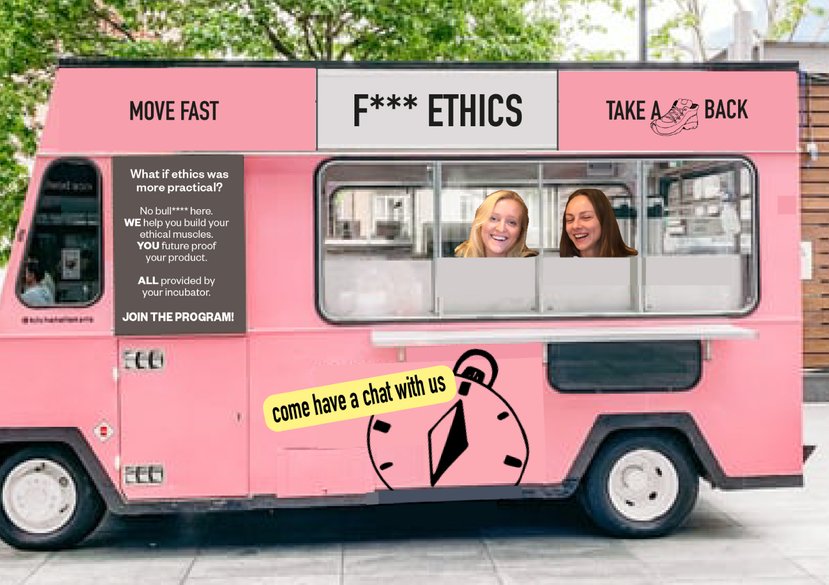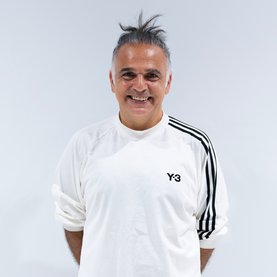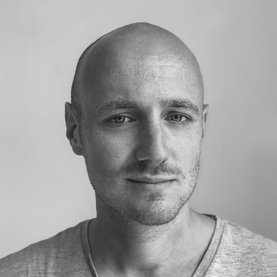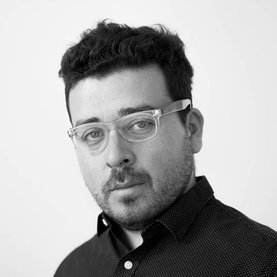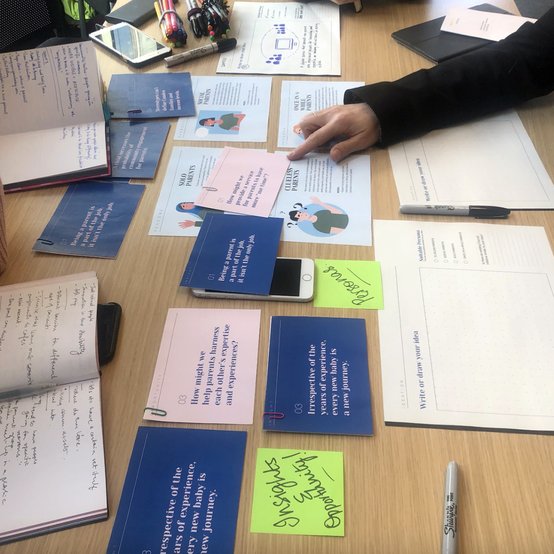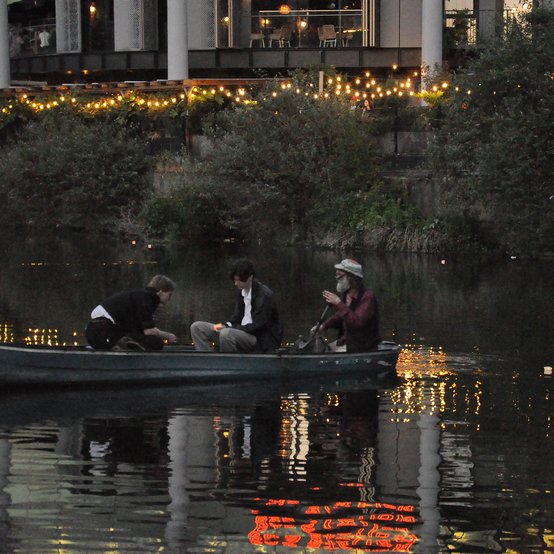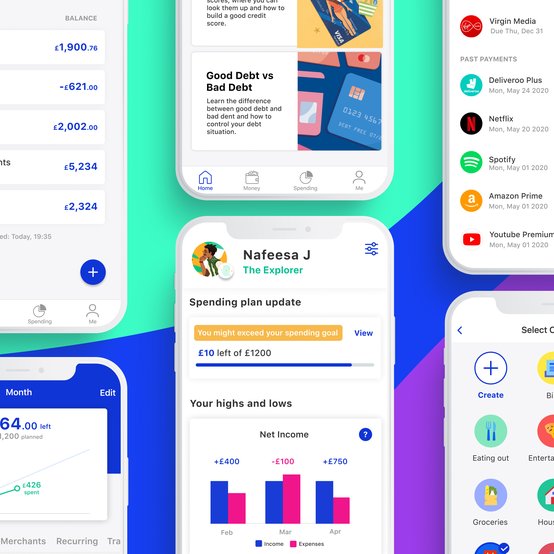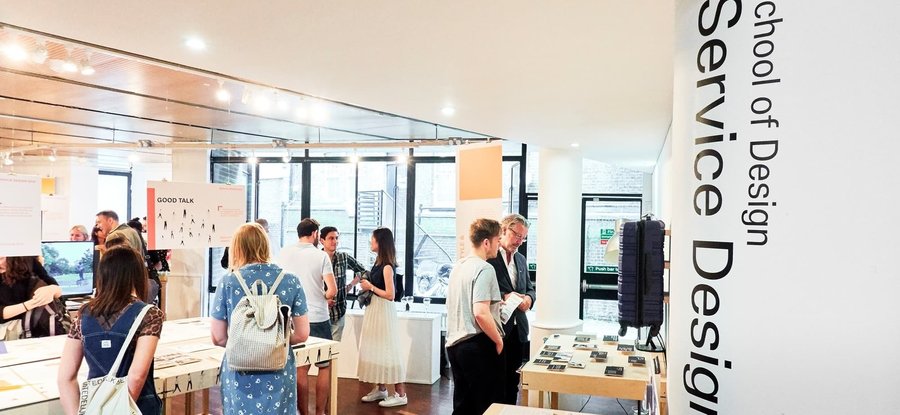
Overview
A new frontier for designers
Key details
- 180 credits
- 1 year programme
- Full-time study
School or Centre
Location
- Kensington
Next open event
- 17 Apr 2024
- Visit Online Open Days
Application deadline
- 14 Aug 2024
Transform customer and citizen experiences.
Service Design applies human-centred design methods to complex systems, creating practical, visionary services for improved human experiences.
Join us and learn to innovate with human insight, prototype new futures, and grasp complex systems through the Service Design programme. Blend theory, critique, and real-life projects to develop your practice.
We empower students from diverse design and innovation backgrounds to answer the challenges of technological, social and environmental futures in commercial, social and public contexts. Using a human-centric approach to systems, technology and societal trends, we deliver the practical tools, the intellectual frameworks and the professional practice required for you to deliver transformational change in the world.
Applications for the September 2024 intake are open and will be assessed on a rolling basis. Programmes will close for applications when the maximum number of places have been awarded, or at the final deadline on 14 August, 12 noon (UK time).
Explore our graduate work
In July 2023, students presented RCA2023, a series of exhibitions and events. Explore online at https://2023.rca.ac.uk/
You can also view previous events and exhibitions online at Showcase.
Find out more about this programme
Catch the replays from our latest online Open Day.
Gallery
Staff
Facilities
The School of Design is based across our Battersea and Kensington sites.
View all facilitiesStudents have access to the College’s workshops, with traditional facilities for woodworking, metalworking, plastics and resins, including bookable bench spaces. Computer-driven subtractive milling equipment is available, as well as additive rapid prototyping.
Our alumni
Our alumni form an international network of creative individuals who have shaped and continue to shape the world. Click on each name to find out more.
Where will the RCA take you?- Judah Armani
- Vivienne Heyhoe
- Kristi Hodak
- Charlyne Lefebvre-Paillé
- Valentina Lopez
- Mariepi Manolis
- Anna Poeyry
- Hazel Scrimgeour
- Harry Trimble
- Helena Trippe
- Ella Walding
More details on what you'll study.
Find out what you'll cover in this programme.
What you'll cover
What will I learn?
You’ll apply design methodologies and principles to real scenarios through collaborations with organisations working in enterprise, social and public roles. This approach brings real issues and opportunities that respond to current and future disruption or innovation. Collaborating in teams, you will move through the design process of deep research, issue reframing, creative concept generation, prototyping and user testing. In doing so, you’ll understand and experience how design tools enable you to imagine and deliver sustainable solutions.
How will I learn?
There will be several opportunities to collaborate with others, but at a minimum, your programme will include 287.5 contact hours and 1512.5 independent study hours. Contact hours can consist of lectures, seminars, tutorials, critical forums and workshops, among other types of teaching delivery.
Your programme's Teaching types include briefings, projects, tutorials, seminars, lectures, critical forums, technical inductions, workshops, offsite visits and blended learning.
Programme structure
The programme is delivered across three terms and includes a combination of programme, School and College units.
The first two terms will take you from a foundation of the tools and methodologies to advanced techniques and management skills, which are applied through projects leading to the Independent Research Project in the third term.
Term 1
Service Design Foundation Methods and Materials (45 credits) encompasses the whole term and consists of lectures on the methods and materials of service design accompanied by three project sprints in which these methods are applied.
You will develop an understanding of core design processes and skills and demonstrate learning from the taught aspect of the programme through practical exercises that are applied to a live student project. The initial project develops a theoretical and practical understanding of the ecosystems of services, develops skills in research, design sprints and the interaction between humans, technology and systems.
- You will take part in a short “Icebreaker” project to deconstruct a service you are familiar with.
- A subsequent project explores how services are delivered through the “Future of Work”. This project assesses your ability to analyse and apply foundation methods and materials in a live project environment.
- The second half of the term is a project in collaboration with external organisations around a set of “Challenge Labs” exploring different areas of social, business and technological challenges. These typically include challenges around healthcare, technology ethics, business services, social impact and sustainability.
Term 2
On Advanced Service Design Methods (15 credits), you'll look at the role of the service designer in developing transformational programmes to reframe projects. You will develop your projects to a prototype level to validate and iterate your service concept. You will explore delivery across channels, including the human and ethical issues of emerging technology platforms such as AI.
All School of Design students will participate in the Grand Challenge (15 credits), School-wide unit. This unit aims to connect and challenge all students in the School by introducing a ‘wicked’ design problem that requires a cross-disciplinary approach to problem-solving involving an external international scientific or industry partner (or both). This unit and lecture series has successfully connected and disrupted disciplines, people, philosophies and approaches to design thinking whilst providing our student body with unique networking opportunities.
You'll also select a School-wide elective (15 credits).
Across terms 1 and 2, you will participate in AcrossRCA (30 credits). This unit aims to support you in meeting the challenges of a complex, uncertain and changing world by bringing you together to work collaboratively in interdisciplinary teams on a series of themed projects informed by expertise within and beyond the College. These projects will challenge you to use your intellect and imagination to address key cultural, social, environmental and economic challenges. In doing so, you will develop and reflect on the abilities required to translate knowledge into action and help demonstrate the contribution the creative arts can make to our understanding and experience of the world.
Term 3
The self-directed Independent Research Project (60 credits) working in one of several Challenge Labs collaborating with external organisations that bring active projects and challenges. You will develop strategic visions with practical deliverable design interventions to create new services and systems. This project will be the core of the public output of the programme and contribute powerfully to public discourse on the value and suitability of the services and interactions we experience.
The project will be agreed upon in term 2, and an associated partner will be engaged. The project will develop innovative, transformational outcomes based on research, creativity and prototyping.
You will submit experiential outputs and provide a proof of concept for the service proposition, service experience or future vision.
AcrossRCA
AcrossRCA is a compulsory 30-credit unit which is delivered as part of all MA programmes.
Situated at the core of your RCA experience, this ambitious interdisciplinary College-wide unit supports you in responding to the challenges of complex, uncertain and changing physical and digital worlds. Developed in response to student feedback, AcrossRCA creates an exciting opportunity for you to collaborate meaningfully across programmes.
Challenging you to use your imagination and intellect to respond to urgent contemporary themes, this ambitious unit will provide you with the opportunity to:
- make connections across disciplines
- think critically about your creative practice
- develop creative networks within and beyond the College
- generate innovative responses to complex problems
- reflect on how to propose ideas for positive change in local and/or global contexts
AcrossRCA launches with a series of presentations and panel discussions from acclaimed speakers who will introduce the themes and act as inspirational starting points for your collaborative team response.
Delivered online and in-person across two terms, the unit has been designed to complement your disciplinary studies and to provide you with a platform to thrive beyond graduation.
Challenge labs
You will work on a range of live projects from industry that align to different Challenge Labs:
- Social Impact – delivering transformation
- Financial Services – research project on current trends
- Liveable Planet – exploring system change for sustainability
- Service Futures – new models for service design
- Healthcare – behaviour change and better health
The curriculum works across the RCA and our partner establishments, blending design expertise across all departments with technology and business management from London business schools and the Department of Computing at Imperial College London.
Requirements
What you need to know before you apply
We invite candidates from around the world who have a passion for design as a transformational tool and wish to take that to a Masters level. Our selection process looks for a desire to take on challenging issues, to be curious in uncovering reality and bring creativity to finding and delivering new solutions.
The Service Design MA programme takes students with and without a design background who show the right qualities and the intellectual ability and desire for creative innovation as demonstrated through your portfolio. You should have a BA, BSc or similar or minimum of five years professional experience
Students may come from product, communication, digital and user experience design who wish to expand to their capabilities, be recent high performing graduates from other design disciplines as well as from computing and other technical disciplines, be budding entrepreneurs interested in launching new service-led business ventures and mid and senior professionals from industry and the public sector, with evidence of their creative talents as demonstrated by leadership of innovative projects.
What's needed from you
Portfolio requirements
We are looking for portfolios that show clear evidence of:
- Project topics that are challenging and aim to transform.
- Evidence of insight from user research, a sense of curiosity and willingness to uncover new insights.
- Empathy and understanding of people.
- Creative ideas that go beyond the expected and are built on user insight.
- The ability to craft new solutions that are desirable and impactful.
- An understanding of implementation and how concepts can be delivered in a sustainable and viable way.
- Examples that show your ability to shape and form services and experiences from a variety of physical, system or technological touch points to be beautiful and desirable to the user.
Video requirements
We ask that you upload a two-minute video recorded on your phone or laptop, speaking to us directly. High production qualities are not needed. We will review the work in your portfolio, so keep your video simple.
In your video, please explain your motivation to be a service designer and provide an example of your favourite service experience. Please then describe an aspect of service design you are most passionate about. Finally, briefly describe your favourite project in your portfolio and describe why you chose it.
This will be a chance to showcase your understanding of service design, your passion to study at a Master’s level and your ability to communicate the value and impact of your work.
English-language requirements
If you are not a national of a majority English-speaking country you will need the equivalent of an IELTS Academic or UKVI score of 6.5 with a 6.0 in the Test of Written English (TWE) and at least 5.5 in other skills. Students achieving a grade of at least 6.0, with a grade of 5.5 in the Test of Written English, may be eligible to take the College’s English for Academic Purposes course to enable them to reach the required standard.
You are exempt from this requirement if you have received a 2.1 degree or above from a university in a majority English-speaking nation within the last two years.
If you need a Student Visa to study at the RCA, you will also need to meet the Home Office’s minimum requirements for entry clearance.
Fees & funding
For this programme
Fees for new students
Fees for September 2024 entry on this programme are outlined below. From 2021 onward, EU students are classified as Overseas for tuition fee purposes.
Home
Overseas and EU
Deposit
New entrants to the College will be required to pay a non-refundable deposit in order to secure their place. This will be offset against the tuition fees.
Home
Overseas and EU
Progression discount
For alumni and students who have completed an RCA Graduate Diploma and progress onto an RCA Master's programme – MA, MA/MSc, MFA, MDes, MArch, MEd or MRes – within 10 years, a progression discount of £1,000 is available.
* Total cost is based on the assumption that the programme is completed in the timeframe stated in the programme details. Additional study time may incur additional charges.
Scholarships
Scholarships
The RCA scholarship programme is growing, with hundreds of financial awards planned for the 2024/5 academic year. Examples of financial awards offered in 2023/24 are given below.
The Deputy Vice-Chancellor’s International Scholarship
For: All MA programmes, MArch, MFA, MDes, MRes & MEd
Eligibility criteria: Students from Australia, Bangladesh, Canada, Colombia, Cyprus, Egypt, France, Germany, Greece, Hong Kong, India, Indonesia, Ireland, Israel, Italy, Japan, Lebanon, Malaysia, Mexico, Nigeria, Pakistan, Poland, Portugal, Saudi Arabia, Singapore, South Korea, Spain, Sri Lanka, Switzerland, Taiwan, Thailand, Turkey, UAE, USA
Eligible fee status: Overseas fee status
Value: £7,000 towards fees
The Deputy Vice Chancellor’s EU Scholarship
For: All MA programmes, MArch, MFA, MDes, MRes & MEd
Eligibility criteria: Students from Austria, Belgium, Bulgaria, Croatia, Cyprus, Czech Republic, Denmark, Estonia, Finland, France, Germany, Greece, Hungary, Iceland, Italy, Latvia, Liechtenstein, Lithuania, Luxembourg, Malta, Netherlands, Norway, Poland, Portugal, Romania, Slovakia, Slovenia, Spain, Sweden, Switzerland, Turkey
Eligible fee status: Overseas fee status
Value: £7,000 towards fees
The Deputy Vice-Chancellor’s UK Scholarship
For: All MA programmes, MArch, MFA, MDes, MRes & MEd
Eligible fee status: Home fee status
Value: £5,000 towards fees
The RCA UK Disabled Students’ Scholarship
For: All MA programmes, MArch, MFA, MDes, MRes & MEd
Eligibility criteria: Students who identify as D/deaf or disabled
Eligible fee status: Home fee status
Value: £6,000 for living costs
Sir Frank Bowling Scholarships
For: All programmes excluding PhD & short courses
Eligibility criteria: Black or Black British Caribbean, Black or Black British African, Other Black Background, Mixed - White and Black Caribbean, Mixed - White and Black African
Eligible fee status: Home fee status
Value: Full fees & maintenance
The Vice-Chancellor’s UK Cost of Living Scholarship
For: All MA programmes, MArch, MFA, MDes, MRes & MEd
Eligible fee status: Home fee status
Value: £5,000 for living costs
Logitech Diversity Scholarships in Art and Design
For: MA Design Products, MA Fashion, MA Service Design, MA Textiles, MA/MSc Innovation Design Engineering
Eligibility criteria: Students from under-represented communities
Eligible fee status: Home & Overseas fee status
Value: Full fees
House of Fraser Bursary
For: Any MA programme
Eligible fee status: Home fee status
Value: £10,000 towards fees
Applying for a scholarship
You must hold an offer to study on an RCA programme in order to make a scholarship application in Spring 2024. A selection of RCA merit scholarships will also be awarded with programme offers.
We strongly recommend that you apply for your programme as early as possible to stand the best chance of receiving a scholarship. You do not apply directly for individual awards; instead, you will be invited to apply once you have received an offer.
More information
Additional fees
In addition to your programme fees, please be aware that you may incur other additional costs associated with your study during your time at RCA. Additional costs can include purchases and services (without limitation): costs related to the purchase of books, paints, textiles, wood, metal, plastics and/or other materials in connection with your programme, services related to the use of printing and photocopying, lasercutting, 3D printing and CNC. Costs related to attending compulsory field trips, joining student and sport societies, and your Convocation (graduation) ceremony.
If you wish to find out more about what type of additional costs you may incur while studying on your programme, please contact the Head of your Programme to discuss or ask at an online or in person Open Day.
We provide the RCASHOP online, and at our Kensington and Battersea Campuses – this is open to students and staff of the Royal College of Art only to provide paid for materials to support your studies.
We also provide support to our students who require financial assistance whilst studying, including a dedicated Materials Fund.
External funding
There are many funding sources, with some students securing scholarships and others saving money from working. It is impossible to list all the potential funding sources; however, the following information could be useful.
Payments
Tuition fees are due on the first day of the academic year and students are sent an invoice prior to beginning their studies. Payments can be made in advance, on registration or in two instalments.
Start your application
Change your life and be here in 2024. Applications now open.
The Royal College of Art welcomes applicants from all over the world.
Before you begin
Make sure you've read and understood the entrance requirements and key dates
More information about eligibility and key datesCheck you have all the information you need to apply.
Read our application process guideConsider attending an Open Day, or one of our portfolio or application advice sessions
See upcoming sessionsPlease note, all applications must be submitted by 12 noon on the given deadline.
Ask a question
Get in touch if you’d like to find out more or have any questions.


